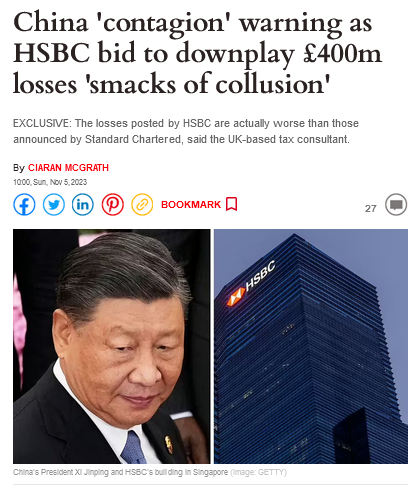Published on 5th December 2023
This is the second of the three blogs on the problems of British banks in China.
You can access the whole article to which the above snapshot is the headline, via the Daily Express website through this link:
https://www.express.co.uk/news/politics/1831225/china-contagion-hsbc-standard-chartered
HSBC released their Q3 2023 results a few days after Standard Chartered did the same, and with an amount of write-downs within the same range, and accompanied by a ‘the worst is over’ message.
The releases by the two banks were so similar that it was hard to believe they had not been coordinated so as to calm any investor concerns. As I result I did some research into the numbers, and you can download that research here.
HSBC’s losses look to be severely downplayed compared to Standard Chartered’s. The bank is four times as large, but the announced losses are within the same range.
If Standard Chartered’s 28% write-down of its 16.26% stake in China Bohai Bank is well-founded, then a write-down of HSBC’s 62% stake in Hang Seng Bank is merited. This stake was worth about £11.8 billion at the start of the year (depending on the exchange rate), so a 28% write-down would be in the £3.3 billion range.
HSBC’s commercial property portfolio looks particularly poor – and the portion lent in Hong Kong is worse than the low average – such that a write-down of £400 million scarcely looks adequate to the problems in it. Indeed, £3 billion out of the £3.8 billion of commercial property loans in Hong Kong that are rated as ‘sub-standard’ or ‘credit impaired’ are also unsecured.
That is quite a novelty in my experience, to categorise unsecured lending as ‘real estate lending’. The presupposition of the usage of term ‘real estate lending’ is that the bank has security over the object for which the loan was made, either to buy it or to construct it.

